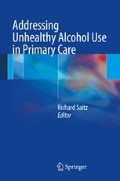Abstract
Confidentiality is a serious consideration in the identification and management of patients with unhealthy alcohol use in primary care. Clinicians need to be aware of Federal and other regulations that are relevant. They should also be aware of the risk of stigma and discrimination their patients face. Nonetheless, clinicians caring for such patients should document encounters accurately and use common sense in collecting sensitive information and in sharing it with other clinicians, within the bounds of applicable regulations. Some regulations may not be crystal clear, and as with many practices in medicine, protection and use of information will need to be based on sound judgment.
Access this chapter
Tax calculation will be finalised at checkout
Purchases are for personal use only
References
Summary of the HIPAA privacy rule. http://www.hhs.gov/ocr/privacy/hipaa/understanding/summary/index.html. Accessed 17 March 2012.
Chezem L. Legal barriers to alcohol screening in emergency departments and trauma centers. Alcohol Res Health. 2004/2005;28(2):73–77.
Code of Federal Regulations (CFR) 42 Part 2. http://www.gpo.gov/fdsys/pkg/CFR-2002-title42-vol1/pdf/CFR-2002-title42-vol1.pdf. Accessed 17 March 2012.
Substance Abuse and Mental Health Services Administration U.S. Department of Health and Human Services. Applying the Substance Abuse Confidentiality Regulations 42 CFR Part 2 (revised). http://www.samhsa.gov/about/laws/SAMHSA_42CFRPART2FAQII_Revised.doc. Accessed 17 March 2012.
Frequently asked questions. Applying the substance abuse confidentiality regulations to Health Information Exchange. http://www.samhsa.gov/HealthPrivacy/docs/EHR-FAQs.pdf. Accessed 17 March 2012.
Applying the Substance Abuse Confidentiality Regulations 42 CFR Part 2 (REVISED). Substance Abuse and Mental Health Services Administration. U.S. Department of Health and Human Services. http://www.samhsa.gov/about/laws/SAMHSA_42CFRPART2FAQII_Revised.pdf
Author information
Authors and Affiliations
Corresponding author
Editor information
Editors and Affiliations
Rights and permissions
Copyright information
© 2013 Springer Science+Business Media New York
About this chapter
Cite this chapter
Saitz, R. (2013). Confidentiality. In: Saitz, R. (eds) Addressing Unhealthy Alcohol Use in Primary Care. Springer, New York, NY. https://doi.org/10.1007/978-1-4614-4779-5_16
Download citation
DOI: https://doi.org/10.1007/978-1-4614-4779-5_16
Published:
Publisher Name: Springer, New York, NY
Print ISBN: 978-1-4614-4778-8
Online ISBN: 978-1-4614-4779-5
eBook Packages: MedicineMedicine (R0)

